Every decision taken today by policymakers affects a youth today and tomorrow. It is therefore important to ensure that the people that will bear the blunt repercussions of today’s decisions tomorrow are given the opportunity to have a say in that decision-making process. It is a basic requirement that all functioning democracies need to be representative, which means that all parts of society must be included in the democratic processes and institutions. The youth form a significant part of the population in sub-Saharan Africa and Ghana is not excluded. This means that when the youth are disenfranchised or are not engaged in the governance process, a large chunk of the population will have no voice or influence in the decision-making process that directly affects their lives.
It is therefore essential in the long term to provide interventions that will ensure that the youth are engaged in formal political processes and have a say in formulating today’s and tomorrow’s policies. Since independence, Ghana has had a youthful population. On the average, the youth have constituted more than 50% of the nation’s population, as per the Population and Housing Census Reports from 1960 up to 2010. Despite their numeric value and the rhetoric description of youth as “future leaders”, the youth in Ghana under the Fourth Republic have remained largely under-represented from the mainstreams of politics, governance and the entire democratic process (Ahwoi, 2006). It is important to change that status quo and engage youth in decisions that affect their livelihood. Part of Global Changemakers Africa’s assignment is to nurture transformational leaders who can set the agenda and affect policies and decision-making pertaining to them.
To embrace this new paradigm shift, Global Changemakers Africa (GCA) since its inception, has created a safe space, nurtured and provided the voice for youth within the family to set and drive their own development agenda. Global Changemakers Africa, an initiative of Translead Consult, which is a human capital and leadership capacity building entity, as well as a clearing house of human capital development expertise, headquartered in Accra, Ghana, West Africa, is positioned to set and drive its own development agenda. It has also promoted the involvement of young people in faith, transformational, entrepreneurial and the digital revolution. The GCMA family platform’s aim is building capacity and strengthening engagement of youth (between fifteen and Forty Five) in current policy and decision-making processes at the national, sub-regional and continental levels.
The vision for GCA family is to nurture youth who are empowered to speak coherently to stakeholders on policy issues, implementation and monitoring thereof. It is from this background that Global Changemakers Africa on December 3, 2021, organized a youth empowerment summit for tertiary students’ leaders, under the Theme: “Reaching and Empowering a critical Generation”, at the Knutsford University in Accra. The engagement
brought together over two hundred participants, made up of student leaders in Accra and its environs, youth organizations and networks, youth leaders, youth activists, young entrepreneurs, policy shapers, civil society and academia.
The occasion was used to introduce Student leaders to the Global Changemakers Africa’s purpose, objectives and benefits. An enabling environment was created for student leaders and youth organizations present to engage each other better Some of the key speakers of the day were Dr. Kwabena Bempah. Dep. Director-General, Ghana Education Service, Mr. Seth Oteng. Executive Director, Youth Bridge, Ms. Jessica Opare-Saforo, TV Personality/ Programmes Manager, Citi FM, Irene Logan, a GCA Brand Ambassador/ Artiste/ Entrepreneur, and Mo Olumide Obidiram, Deputy Director-General, Nigerian Association of Small Scale Industries. All the speakers took turns to share their life stories to inspire the youth and encourage them to aspire for a better future. According to Bishop Eric Kwapong, Founder of Translead/ Global Changemakers Africa, the youth summit was a precursor to a bigger conference in March 2022. “Student leaders and youth organizations would be inspired and be better equipped to rally the student’s they represent better for the March 2022 conference,” emphasized.
Story By: Gilbert Borketey Boyefio






